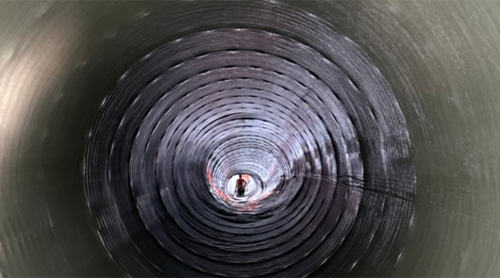
June 13, 2025
Why UV-Cured In-Place Pipe Lining is the Gold Standard for Solving Infiltration Problems
This is the first installment of a ten-part series where we take a deeper look into the Top 10 reasons to use ultraviolet cured in place pipe (UV-CIPP). The topic of this article will look at the benefits of installations involving infiltration.
When water finds its way into sewer systems where it doesn't belong, it creates a cascade of expensive problems. Infiltration—the unwanted entry of groundwater, stormwater, or surface water into sewer pipes—can overwhelm treatment facilities, cause backups, and lead to environmental contamination. For infrastructure managers facing these challenges, ultraviolet cured-in-place pipe (UV-CIPP) lining has emerged as the preferred solution, and for good reason.
Understanding the Infiltration Challenge
Pipe infiltration typically occurs through cracks, joint failures, and deteriorated pipe walls, especially in aging infrastructure. Traditional repair methods often involve extensive excavation, lengthy construction timelines, and significant disruption to surrounding areas. But what if there was a way to create a completely sealed, jointless pipe system from the inside out, without digging up a single shovel of dirt?
The UV-CIPP Advantage: Why It's Becoming the Industry Standard
1. Complete Infiltration Elimination
UV-CIPP creates what engineers call a "pipe within a pipe”, a seamless, jointless liner that conforms directly to the existing host pipe. Unlike traditional pipe systems with multiple joints and potential failure points, UV-cured liners eliminate these weak spots entirely. The result is a completely watertight seal that stops infiltration at its source.
2. Lightning-Fast Installation
While traditional CIPP methods require hours of heat curing, UV-CIPP hardens almost instantly under ultraviolet light exposure. This rapid curing process means installations can often be completed within a single day, dramatically reducing project timelines and minimizing service disruptions.
3. Superior Environmental Performance
UV curing eliminates the need for high temperature "cooking" processes that traditional felt CIPP requires. This cooler process significantly reduces the release of styrene and other chemical byproducts, making it safer for workers and surrounding communities—a critical consideration when working in populated areas or environmentally sensitive locations.
4. Weather-Independent Operations
Unlike heat-cured methods that can be affected by ambient temperatures, UV-CIPP can be installed effectively in both hot and cold conditions. This flexibility allows contractors to maintain consistent project schedules year-round, regardless of weather conditions.
5. Enhanced Structural Integrity
The UV curing process creates a uniform, high-strength liner with consistent wall thickness. Many UV-CIPP systems incorporate advanced materials like fiberglass, providing exceptional durability and a service life of 50-100 years when properly installed.
Real-World Performance: Where UV-CIPP Shines
UV-CIPP has proven particularly effective in challenging infiltration scenarios:
The Technical Edge: Why UV Light Makes the Difference
The UV curing process offers several technical advantages over traditional methods:
While the immediate cost savings from avoiding excavation are obvious, UV-CIPP delivers long-term value through:
Making the Case for UV-CIPP
For infrastructure managers evaluating options for infiltration problems, UV-CIPP offers a compelling value proposition:
The Bottom Line
When pipes are compromised by infiltration, UV-CIPP doesn't just fix the problem—it upgrades the entire system to modern performance standards. The combination of rapid installation, superior sealing capability, environmental benefits, and long-term durability makes UV-CIPP the clear choice for addressing infiltration challenges.
As infrastructure continues to age across the globe, the demand for effective, minimally disruptive rehabilitation solutions will only grow. UV-CIPP technology represents not just a repair method, but a strategic approach to infrastructure management that prioritizes both immediate problem-solving and long-term asset protection.
For any organization dealing with pipe infiltration issues, the question isn't whether UV-CIPP is worth considering, it's whether you can afford not to implement this proven, future-ready solution.
Interested in learning more about UV CIPP solutions for your infrastructure challenges? Contact Subsurface, Inc., the Leaders in No Dig Infrastructure Repair to discuss how this innovative approach can address your specific infiltration problems.